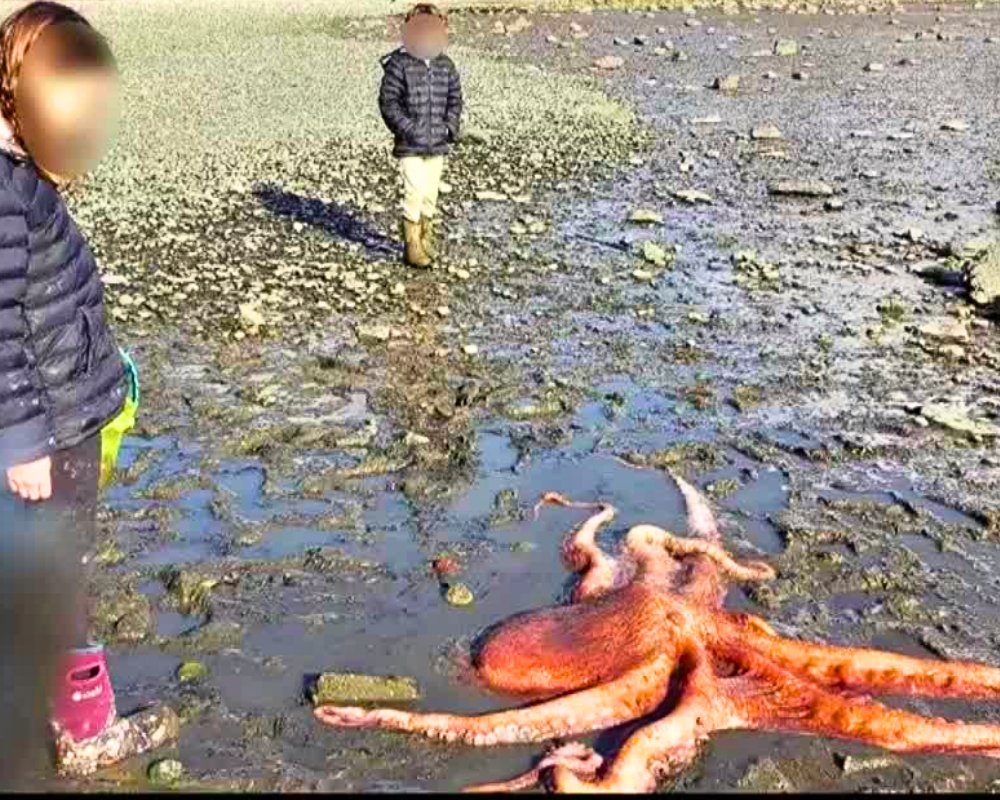On a chilly March morning along Skagit County’s Bay View State Park in Washington, a quiet walk on the beach turned into a life-or-death ocean rescue story no one saw coming.
The tide had receded, leaving behind something extraordinary — and in danger. A giant Pacific octopus, one of the most intelligent creatures in the sea, was stranded on the sand, struggling to breathe.
Normally, these animals stay far from shore. Adults can stretch up to 16 feet across and weigh more than 100 pounds, their eight arms pulsing with quiet strength. They’re problem-solvers, escape artists, even capable of opening jars and solving mazes.
But on that day, all that brilliance was trapped in shallow air, fading fast.

A Cry for Help on the Shore
Families strolling the beach gathered in shock. The octopus — its reddish skin fading with each minute — lay motionless. Some wanted to help but didn’t know how.
That’s when a little girl stepped forward.
She ran to her parents, grabbed a bucket of seawater, and began gently pouring it over the octopus. Over and over, she refilled and poured again, refusing to let the creature dry out.
Her quick thinking bought time — and saved a life.
Soon after, Annie England, a marine specialist with the Padilla Bay National Estuarine Research Reserve, got the emergency call. “It can’t survive out of water for more than several minutes,” England later told NBC News. “It collapses their gills.”
By the time she arrived, the little girl’s steady effort had kept the octopus alive.
Related Read: Kind Whale Saves Diver’s Life from a Huge Tiger Shark in the South Pacific
A Race Against the Tide
England and her rescue team waded in quickly, assessing the situation. “I wasn’t anticipating finding such an alive, healthy octopus,” she said. “It was incredible.”
They couldn’t just grab it — not with an animal this size. Each tentacle was strong and lined with suction cups capable of latching onto anything nearby. The rescuers had to work carefully to support the octopus’s body while avoiding injury to both sides.
Using a large plastic bin, they gently lifted the octopus off the sand and carried it toward the surf. Every movement mattered. “We had to be really conscious of where we held the animal,” England explained. “It’s heavy, soft-bodied, and fragile.”
Onlookers watched as they knelt by the edge of the tide.
Then, finally — water.
The rescuers slowly lowered the bin, and the octopus began to stir.

The Moment of Return
At first, the octopus didn’t rush back into the ocean. It stretched out a few tentacles, feeling the water as if testing its surroundings. Its color brightened — deep red shifting to shimmering purple — a sign of life returning.
Then, with deliberate grace, it slid free of the bin and disappeared beneath the waves.
The crowd on the beach exhaled as one.
“It was probably checking that it was safe,” England said afterward. “They’re incredibly intelligent. You could almost see it thinking.”
It was the first octopus rescue England and her team had ever performed. And it worked because of one little girl’s instinct and a community that decided not to look away.

Also Read: German Shepherd Loves Being Nanny, Continuously Adopting Orphaned Deer for Years
The Smart Plan That Made All the Difference
Pouring water over the animal might sound simple, but it was exactly what experts recommend.
“We never encourage the public to move an octopus or touch it,” England explained. “But pouring seawater on it helps it breathe until professionals arrive.”
That small action — a child’s quick decision — kept the octopus’s gills from collapsing and gave rescuers the window they needed.
It’s a reminder that sometimes, saving a life isn’t about strength or science. It’s about empathy and attention — noticing something struggling and deciding to act.
A Rare and Precious Encounter
Incidents like this are extremely rare. Giant Pacific octopuses usually live far below the surface in cool, rocky coastal waters from California to Alaska and across to Japan. They’re nocturnal, shy, and often unseen by humans.
So seeing one up close — alive and healthy — is something few will ever experience.
“I hope it never happens again,” England said. “But if it does, I hope people remember what to do. That little girl did everything right.”
The Ocean’s Quiet Message
As the waves rolled back over the sand, the beach returned to normal. But for those who were there, it didn’t feel ordinary anymore.
They had witnessed an act of compassion — a rare connection between a child and one of the ocean’s most mysterious creatures.
The giant octopus swam free, vanishing into the deep.
And maybe, somewhere beneath the surface, it remembers the feeling of cold water on its skin — and the tiny hands that made sure it could breathe again.



